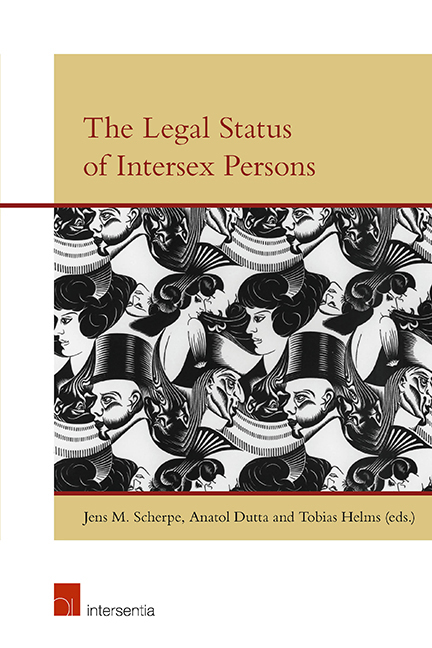Book contents
- Frontmatter
- Preface
- Contents
- List of Contributors
- The Legal Status of Intersex Persons: An Introduction
- Malta Declaration
- Darlington Statement
- Vienna Statement
- PART I MEDICINE AND PSYCHOLOGY
- PART II THEOLOGY AND LEGAL HISTORY
- PART III TRANSGENDER, TRANSSEXUALITY AND INTERSEX
- PART IV NATIONAL LEGAL DEVELOPMENTS
- PART V PRIVATE INTERNATIONAL LAW ASPECTS OF INTERSEX
- Private International Law Aspects of Intersex
- PART VI INTERSEX AND HUMAN RIGHTS
Private International Law Aspects of Intersex
from PART V - PRIVATE INTERNATIONAL LAW ASPECTS OF INTERSEX
Published online by Cambridge University Press: 31 January 2019
- Frontmatter
- Preface
- Contents
- List of Contributors
- The Legal Status of Intersex Persons: An Introduction
- Malta Declaration
- Darlington Statement
- Vienna Statement
- PART I MEDICINE AND PSYCHOLOGY
- PART II THEOLOGY AND LEGAL HISTORY
- PART III TRANSGENDER, TRANSSEXUALITY AND INTERSEX
- PART IV NATIONAL LEGAL DEVELOPMENTS
- PART V PRIVATE INTERNATIONAL LAW ASPECTS OF INTERSEX
- Private International Law Aspects of Intersex
- PART VI INTERSEX AND HUMAN RIGHTS
Summary
The first question we have to deal with is – at least at first sight – rather simple: which law shall decide on the legal gender of an intersex person and the consequences of that gender in cross-border cases, if that person has links to more than one jurisdiction? This question is, of course, crucial: while all jurisdictions of the world agree that natural persons can be legally male or female, there is no such agreement on the question whether intersex persons can acquire a special gender status, for example, a third category of legal gender (however this is named). Currently only a few jurisdictions offer such a specific gender status for intersex persons. In order to answer this seemingly easy question, several issues need to be distinguished and dealt with separately. First, is gender for private international law purposes a matter of fact or a matter of law (on which see Section 1 below)? If the latter, we then have to decide on the applicable law (on which see Section 2 below). However, the problem can also arise as a preliminary question (on which see Section 3 below). Finally, every jurisdiction will have to deal with the recognition of an intersex status acquired abroad (on which see Section 4 below).
WHAT IS THE NATURE OF THE QUESTION?
When addressing private international law issues of intersex, one first has to clarify whether the attribution of a legal gender to a certain person is a legal question and, if so, whether it is a question of substance or procedure.
It is, of course, rather obvious that the legal gender of a person is a question of law and not of mere facts, and therefore the issue of the applicable law arises. The gender of a natural person is different from merely factual personal criteria, for example, the colour of the person's eyes, the birth weight, or the religion of a person – all criteria, which might be registered in some jurisdictions in the civil status registers or identity documents. The fact that many jurisdictions contain provisions on the recognition of the preferred gender identity for transsexual and transgender persons makes clear that the gender of a natural person has to be a legal question.
- Type
- Chapter
- Information
- The Legal Status of Intersex Persons , pp. 415 - 426Publisher: IntersentiaPrint publication year: 2018

